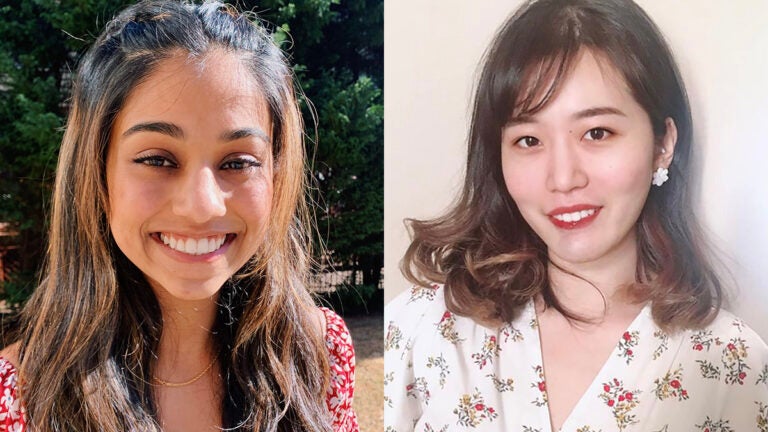
Reimagine Challenge winners Neha Halebeed, left, and Tongqing Zhu. (Photos/Courtesy of Neha Halebeed and Tongqing Zhu)
2 Trojans’ civic-minded projects win Reimagine Challenge 2020
The competition challenged students to develop proposals to help communities hit hardest by the pandemic or spark a global movement capable that would spur 1 million people into action.
Two USC students have been recognized for visionary proposals that use technology in very different ways — one to enable cashless donations to the homeless, the other to improve the emotional well-being of elderly Asian immigrants in L.A.
USC’s Neha Halebeed and Tongqing Zhu are among the 20 winners of Reimagine Challenge 2020, which invited college students to submit proposals on one of two themes: helping communities hit hardest by the pandemic, or sparking a global movement capable of motivating 1 million people to work together.
The two Trojans each earn a $25,000 tuition scholarship along with matching funds for USC, and their proposals are published in an online anthology. The challenge is sponsored by Schmidt Futures, a tech-focused nonprofit initiative founded by Eric and Wendy Schmidt.
“I’m inspired by the bold ideas we received and the rising generation of leaders who developed them,” said Eric Schmidt, former Google CEO. “Although the long-term impact of this pandemic is daunting, we cannot forget we live in the most educated, interconnected, empowered period in human history. If we come together with all of our tools, knowledge, and talents — as these students have done — I’m confident we can build a world that’s fairer, safer and more prosperous for everyone.”
This year’s challenge received 838 submissions from students enrolled in 264 schools in 40 countries.
Reimagine Challenge winner Neha Halebeed: USC student takes technology to the streets
While driving around her hometown of Atlanta, Neha Halebeed — a sophomore at the USC Annenberg School for Communication and Journalism — wanted to give money to people she saw who were experiencing homelessness “but I never had any physical currency on me.” Technology has reduced the amount of cash in circulation, and COVID-19 has accelerated this by prioritizing touchless transactions.
To help overcome this barrier, Halebeed set out to create a system that could deliver donations to the unhoused population. Her proposal: a QR code-based cashless system to replace typical street-side cash donations.
I like thinking about different ways to do things and fix certain problems.
Neha Halebeed
Halebeed said she has long been interested in solutions-based philanthropy, having launched a charity while she was in high school. “I like thinking about different ways to do things and fix certain problems,” she said.
Halabeed began researching the possibility of giving QR codes to the unhoused that would allow them to redeem cash donations at businesses, a system that wouldn’t require any technology on the recipient’s side. She learned that a company in Greece had already begun working on a similar concept, which they dubbed Giving Streets. She reached out to them and has been working with them to develop the technology and bring it to the United States.
Halebeed explains that Greece’s initial test of the QR-code system will involve placing the codes in partner businesses like coffee shops and having the donations go to nonprofits that serve people experiencing homelessness rather than to individuals directly. She said that Giving Streets should be rolling out in Greece by April and hopes that the U.S. version will be ready by December.
She points out that there are legal hurdles to overcome — for example, making sure that donors can’t use these cash transfers to avoid taxes — but for her, the most important questions are ethical ones.
“We want to make sure that we’re not setting up something to benefit unhoused people that actually ends up hurting them,” Halebeed said “Centering this around the people themselves is really important.”
Tongqing Zhu’s challenge proposal: The Sunrise Project
Tongqing Zhu, a Master of Social Work student at the USC Suzanne Dworak-Peck School of Social Work, was recognized by the Reimagine Challenge for her Sunrise Project, a proposal that aims to benefit the social and emotional well-being of elderly Asian immigrants in Los Angeles.
Zhu was inspired by her father, an immigrant from China who Zhu witnessed struggling with English language barrier issues, loneliness and social isolation during the COVID-19 pandemic. She proposes an online portal that will reach out to 100,000 Asian adults aged 65 and older to provide culturally adapted community-based social services in Los Angeles.
“The uniqueness of my project is that every service will be delivered in an Asian language,” Zhu said, including Chinese, Japanese, Korean, Filipino, Thai and Cambodian.
The goal is to reduce older Asian adults’ anxiety, depression and loneliness during the COVID-19 pandemic.
Tongqing Zhu
Zhu’s project hones in on three major components: online therapy, technology workshops and community outreach services. “The goal is to reduce older Asian adults’ anxiety, depression and loneliness during the COVID-19 pandemic,” she said.
Zhu’s Sunrise Project is now part of Schmidt Future’s online anthology which aims to amplify students’ voices around the world and their promising solutions to build a better future. Zhu, who was born and raised in China, plans to become a licensed clinical social worker and provide mental health care to children, adolescents, young adults and their families. Her long-term career goal is to establish child protective services in China.



